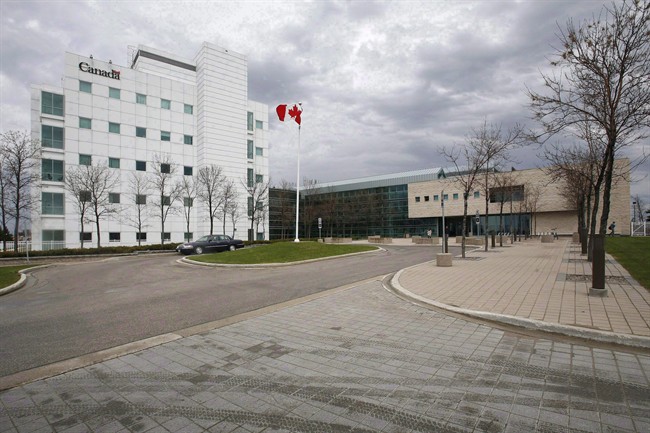TORONTO — A third large-scale trial testing the made-in-Canada Ebola vaccine has begun in West Africa.

The U.S. Centers for Disease Control says it has started a clinical trial in Sierra Leone that will eventually vaccinate 6,000 front-line workers in the fight against the disease.
They include doctors, nurses, treatment centre cleaners, ambulance drivers and teams that bury the bodies of people who have died from Ebola.
The vaccine was designed by scientists at Canada’s National Microbiology Laboratory in Winnipeg and is being developed by a biotech company called NewLink Genetics in partnership with pharmaceutical giant Merck.
The spread of Ebola has declined markedly in Sierra Leone, with only nine new cases reported in the week that ended April 5 — the most recent period for which figures are available.
READ MORE: Guinea may provide answers on Ebola vaccine
That may make it difficult for this trial to show whether the vaccine works; if few or no people in an area are contracting Ebola, it’s impossible to show that a vaccine is protective.
A large U.S.-funded vaccine trial in Liberia is being stymied by the same issue. The parties responsible for that trial — the National Institutes of Health and the Liberian government — are hoping to persuade the government of Guinea to allow the trial to move into that country. Guinea currently has the highest new case count of the affected countries.
Dr. Anne Schuchat, director of the CDC’s national centre for immunization and respiratory diseases, says the design of the Sierra Leone trial has been adapted to try to increase the chances that it will be able to determine whether the vaccine works.
The initial design would have seen people in the study vaccinated in groups, with some randomly selected to get vaccine immediately and others offered vaccine after a delay. If the vaccine works you would expect to see fewer infections in the group that got vaccine early.
Schuchat says the plan now is to randomly assign individuals to get vaccine immediately or after a six-month delay. That will give the scientists running the trial more time to assess if the vaccine works, she says.
If the vaccine is 50 per cent effective — in other words, if it prevents infection in half the people who receive it — that should become clear after 67 infections in the delayed vaccination group, Schuchat says.
But if, as is hoped, the vaccine is more potent, a conclusion could be arrived at sooner. If the vaccine is 90 per cent effective, it would take 17 infections in the delayed vaccine group to show the vaccine works, Schuchat says.
In the week ending April 5 there were no new infections among health workers and in the week prior there was only one in Sierra Leone, according to updates from the World Health Organization. Since the outbreak began, 861 health workers have been infected and 495 have died.
Schuchat notes, though, that the outbreak isn’t over yet.
“We’re thrilled that the disease counts are way down, but people are continuing to get Ebola virus disease,” she says.
“And we know that some of the Ebola outbreaks in the past … haven’t just been snuffed out, but they’ve taken quite a while to really end. And we know that health workers are going to be under continued risk during that period.”
The CDC trial is also being financed by the U.S. government, with help from the CDC Foundation.



Comments